#post-TROS Mood
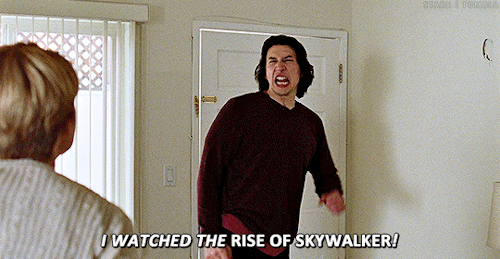
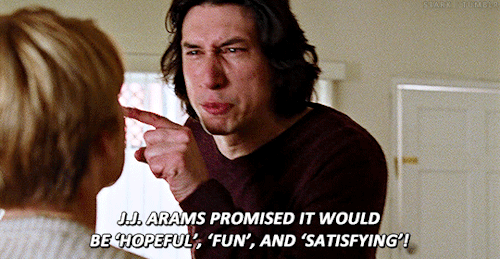
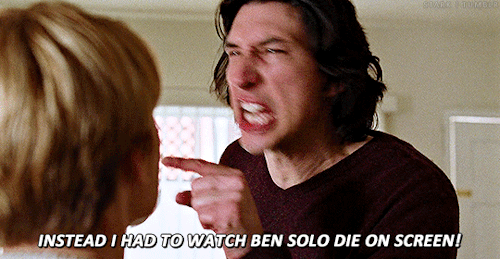
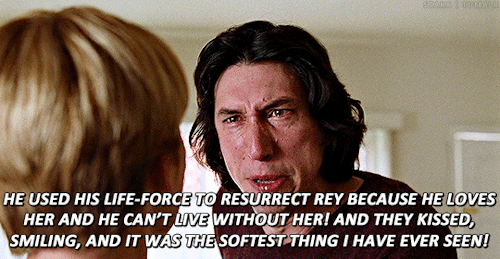
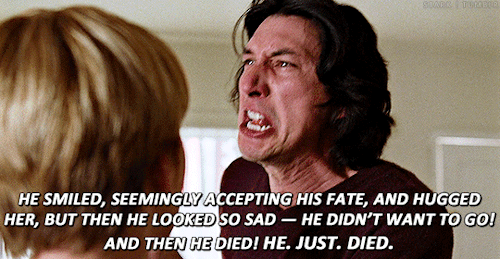
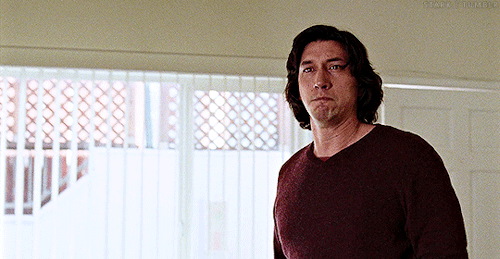
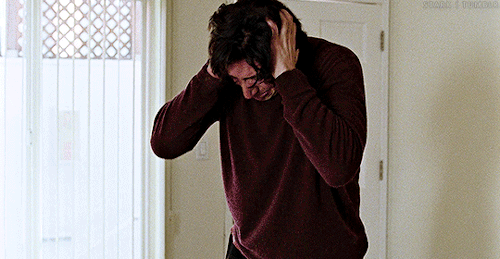
#post-TROS mood
More Posts from Littlewinnypsyco and Others


I would know him in death, at the end of the world.


Baby Bee AU fluff after the angst 🥺🤲





Lauren Ridloff as Makkari in ‘Eternals’ (2021)

“We were separated. He couldn’t touch me.”
TLJ: rey’s parents were nobodies. she doesn’t descend from some ancient bloodline. her strength is not attributed to some (male) ancestor, it comes solely from herself.
TROS: *makes rey a palpatine*
me:

TLJ: rey’s parents were bad people who sold her. this is thematically important to her whole arc about finding her identity. in order to grow and mature as a character, she must let go of the idealised picture of her parents she has in her head and the harmonious infancy she never had. she wants her parents to be good, noble people, and by having them be bad nobodies, we force her to change and grow, to create her own place in the universe/her own identity.
TROS: actually rey’s parents were G O O D P E O P L E who sold her to ~protect~ her uwu
me:

TLJ: we killed snoke to make room for the actually interesting conflict, the one between the conflicted supreme leader kylo ren and the resistance, his mother and rey.
TROS: *brings back palpatine*
me:

TLJ: the jedi failed. they were arrogant and stuck in their ways. they were so terrified of the dark side that they turned a blind eye to the darkness rising with palpatine. they deal in absolutes. it is time to let this flawed order die. we must learn from our past mistakes. failure is the greatest teacher.
TROS: rey is a jedi now
me:

TLJ: rey and kylo have a complicated relationship. they are beyond physically fighting each other, they now have to figure out their emotional conflict on how they are going to navigate their force bond connection and ambiguous feelings as supreme leader and resistance fighter.
TROS: *more lightsaber fight nonsense*
me:

TLJ: rose is a self-assured, determined character, an integral part of this story. she acts as moral authority to finn, helps him find his purpose in the resistance and embodies hope, resilience and fighting for the right cause.
TROS: *1:16 minutes of screen time*
me:

TLJ: rose and finn share a kiss
TROS: …y'all hear sumn?
me:

me @ disney, jj abrams, chris terrio or whoever is responsible for this mess:

THOSE SNEAKY EDITORS
Ben wasnt suppose to die and here is a reason why. If u look at the original clip, u see how weird and unnatural Reys arms looks. In the reversed one, Reys elbow/arm looks more normal when she tries to pull Ben up then in the one where she tries to prevent Ben from smashing his head into the ground. Also why woukd Rey support her arm with her other hand if she was pulled, it would make more sense if she would support her arm to pull Ben up!


THOSE SNEAKY EDITORS REVERSED THE SCENE
It would also make sense why Reys expression isnt that sad but more concerned CUZ BEN ISNT DEAD
Was kylo redeemed with his sacrifice to rey? Do you think that negates all his past actions ? Regardless of the motive or cause ?
“what does he have to be redeemed for?” Adam Driver
You can tell the frustration during the interview, that he himself has been thinking about it so much, that he delved into what made him Kylo Ren but also human, that HE knows the backstory.
A backstory that was almost completely absent from TROS, if you count Palpatine “ I was every voice you ever heard in your head” inferring manipulation and lies. The story omits completely his childhood, the feelings of betrayal he felt as his own parents feared him, the way they sent him away and the ultimate failure from his own uncle is not once mentioned, it omits that he never massacred his Jedi friends ( comic) that he never destroyed the temple, that he felt so alone, traumatised and ashamed that he went to the only welcoming place : Snoke / aka Palpatine
He was a victim, with a feeling of helplessness and depression so strong that seeking the dark side by killing his dad was really a form suicide.
You’re son is dead // My son is alive // ergo kill the father to kill the son at last
Han Solo tried to bring him home in TFA and failed, but once Rey admitted that she loved Ben Solo, he went back to the moment he killed his father, the moment that tormented him with his guilt. He replayed the scene, and this time He really heard and understood what his father was telling him, he welcomed it.
His father’s love, his mother’s love were unconditional and he could go home at ANY time…. they always loved him. At this moment Kylo literally TURNS around, he turns and THROWS aways his lightsaber, and later off screen the top layers of the Kylo Ren persona, to reveal only BEN SOLO, damaged and all. He freed himself.
I think, the Han Solo scene shows that Kylo/ Ben had to forgive himself first, before moving on, he was held back by guilt and resentment and thought he had done too awful a thing that it was impossible to come back.
Finally Ben SOLO came for REY. It was not Kylo anymore.
Ben Solo never had anything to be redeemed for, he was a victim.
But even then, he made the ultimate sacrifice, selfless, without thinking twice about it, he gave Ben Solo’s life to Rey, out of pure LOVE. He is more than redeemed, he’s a hero in that scene.
The movie does not do him justice, by telling us what’s happening to him. We can only read the subtext, he’s either one with Rey, making her Skywalker, or one with the Force, but they only wanted to have the legacy Force ghost in the end, as new parental figures, or he is somewhere yet unknown. The story is cruel because it does not really bring closure to his fate.
BUT Ben solo is a hero.
ok but


do you ever just


remember the way


these assholes


look at each other




and it just makes you


mentally unstable



like when they instantly found each other with their eyes on a fucking battlefield with over 30,000 men




because i can’t fucking deal



with their shit anymore


you can literally feel the passion and love through their fucking eyes i’m done

with their fucking unresolved sexual tension


people be like “why are you shipping jonsa they’re siblings”


honey these assholes ship themselves


i am only a vessel


Death in Star Wars, and How Ben Solo Was Shafted: A Mini Meta
Something has been bothering me about Ben’s death in The Rise of Skywalker. While I’m upset that he died, I echo the sentiments of other fans that just as offensive was the way that he died and how his death was treated in the context of the film. It bothered me because death has always been a part of Star Wars, but usually handled much better.
And so this meta was born.
I will be doing a brief analysis of significant character deaths from the Star Wars movies. I don’t want to touch on all of them because there are simply too many, so I’ll focus on the ones that were either major characters (i.e. trio billing or main villain) or narratively important (i.e. Shmi Skywalker).
This list will be approached chronologically within the Star Wars universe, beginning with:
Qui-Gon Jinn; portrayed by Liam Neeson
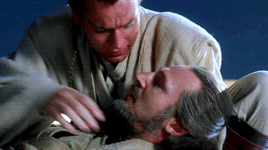
Personal feelings: I cried like a baby. Qui-gon holds a special place in my heart. His death was both epic and sombre. It hurt to watch other main cast celebrating their victory after defeating their respective challenges and then cut to Obi-wan cradling his master’s head in his lap, crying.
Mode of death: Killed by Darth Maul at the end of The Phantom Menace. His actual death takes a few minutes of screen time, an outburst/scream from another main character (Obi-wan). He has last words to say to the person he has the closest on screen relationship with.
Aftermath: Held by a visibly devastated Obi-wan while he died. Sombre funeral pyre. Death discussed on screen by the council and Obi-wan.
Narrative purpose: To enable Anakin’s training under Obi-wan, which is pivotal to the overall arc of this trilogy. To provide a tangible loss and character growth for Obi-wan, who failed to save his master from a Sith–later mirrored by Obi-wan’s inability to save Anakin from becoming a Sith in Episode III, thereby providing a narrative ‘tail-end’ to Obi-wan’s journey in the trilogy. To cement the master/apprentice relationship as loving, emotional, familial, which then adds narrative depth to the bond between Obi-wan and Anakin. To introduce a cohesive theme of death, failure, and loss at the hands of the dark side that would pervade this trilogy.
Overall response: This death is both emotional and narratively important. It’s given the weight and time it deserves to have an impact on the characters.
Shmi Skywalker; portrayed by Pernilla August

Personal feelings: Rough acting aside, watching a person die in their family member’s arms is always sad. It’s an extremely dark moment in a film that otherwise leans heavily into romance, action, and detective-mystery storytelling.
Mode of death: Tortured by Tusken Raiders. Died from her injuries. Again, her actual death takes a couple of minutes of screen time. She is able to say some last words to her son, the most important character relationship for this character.
Aftermath: Dies in the arms of her visibly devastated son. Anakin murders the Tuskens for revenge. On screen funeral where she is mourned and memorialized by her family/loved ones.
Narrative purpose: To drive Anakin further to the dark side by taking advantage of his love and compassion and turning this into anger and hate (revenge against the Tuskens). To plant the seeds of Anakin’s inability to save the ones he love. To emphasize his failure to keep his promise to return to his mother and free her. (Despite being freed off screen, she essentially died in captivity anyway, and Anakin was not the one to free her.) To further the cohesive themes of the trilogy: death, failure, loss, the power of the dark side.
Overall response: While not as moving for me personally as Qui-gon’s death, it has a very relevant thematic purpose and furthers the story. Shmi’s death is given adequate time on screen and we are able to observe the responses and aftermath of that loss.
Padme Amidala; portrayed by Natalie Portman

Personal feelings: We make jokes about how she lost the will to live, but her funeral was beautiful and Natalie’s delivery of the line “you’re going down a path I can’t follow” feels extremely important in this story.
Mode of death: Up for debate. She has lost the will to live after giving birth to Luke and Leia in the wake of Anakin’s fall to the dark side. Some have theorized that her life force was taken (or given?) to keep Anakin alive, but this is not made explicit in the movies. She dies beside Obi-wan Kenobi, and has the time to say last words–words of hope for Anakin’s eventual redemption. Her death itself takes several minutes and is followed up with screen time for a funeral where characters acknowledge her death.
Aftermath: The gorgeous and enormous funeral, mourned as a queen and a senator and a good woman. Anakin (as Darth Vader) mourns with a devastated and poorly acted “nooooo”.
Narrative purpose: To fulfill the themes of death, loss, and failure (Anakin’s failure to keep her alive) at the hands of the dark side. To provide a character loss that mimics the loss of democracy, freedom, and goodness that has fallen to Palpatine’s control. To provide a visual and narrative parallel between the death of Anakin (through the death of his love) and the birth of Darth Vader.
Overall response: While this death was definitely poorly handled it did have narrative significance and it was arguably necessitated by having to have this trilogy line up with the original trilogy. Her short funeral was one of my favorites in the series.
Obi-wan Kenobi; portrayed by Sir Alec Guinness/Ewan McGregor

Personal feelings: I feel weird having an opinion about this one because this movie was made well before I was born, and so I didn’t feel a real connection to/nostalgia from these characters the way I did with the prequels and sequels. Ewan McGregor as Obi-Wan was a huge part of my childhood, so watching A New Hope in retrospect makes this death sad for me.
Mode of death: Killed by Darth Vader/becomes one with the Force. Essentially sacrifices himself so that Luke doesn’t try to come after him.
Aftermath: Luke shouts “no!”. In a later scene, Luke further acknowledges his death–”I only wish Ben were here”. Ben is later seen as a Force ghost in Episodes V and VI, continuing to acknowledge his character’s death and ongoing influence on, importance to, and relationship with Luke.
Narrative purpose: To provide growth for Luke’s character as he grapples with losing a mentor and surrogate father figure who was also the last person (he believed) who was a link to Luke’s (supposedly) dead hero father that Luke looked up to–and setting us up for this narrative complication in VI. To demonstrate that the Jedi/good guys of the film win through self-sacrifice and not through anger, hate, or fear, which is very thematically resonant in this trilogy.
Overall response: Narratively meaningful, and the character’s death is immediately recognized. We get to see the response of the characters who he has the closest relationships with.
Yoda; portrayed by Frank Oz

(I just love The Last Jedi, okay??)
Personal feelings: It was kind of sad, in the way any person dying of old age is. It did feel more overtly spiritual than Obi-wan’s death.
Mode of death: Dies of old age, in his own home, in his own bed, with Luke beside him. His death scene lasts a few minutes and he has some last words.
Aftermath: We see Yoda again as a force ghost, which we are expecting as an audience since his body fades like Obi-wan’s did. There is sufficient closure. Luke is present for Yoda’s death and, at this point in the films, is the only character relationship Yoda has left alive–therefore this is the most significant his death can be to someone. Luke doesn’t look overly upset but this is not painted to be a sad death, as death by old age is usually more a fact of life and a nice reprieve from untimely losses.
Narrative purpose: Honestly, it’s been a long time since I watched the original trilogy so I’m kind of stretching here. I’m going to borrow from The Last Jedi and say that Yoda’s death allows Luke to grow beyond his master and stand on his own two feet as a fully autonomous agent of goodness. He no longer has the crutch of wise older men to lean on and must make his decisions on his own. Yoda’s death frees Luke to be the master of his own destiny, now knowing the truth of his parentage and no longer being guided by others to do what they think is best (kill Vader).
Overall response: One of the less impactful deaths in the series, but I do appreciate how it adds to Luke’s growth as a character and transition into Jedi Master.
Anakin Skywalker/Darth Vader; portrayed by James Earl Jones, Hayden Christensen, and Jake Lloyd
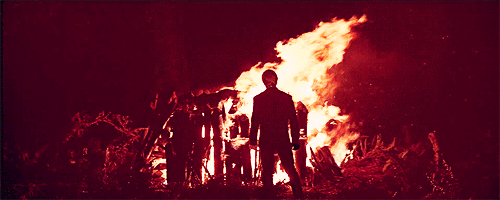
Personal feelings: This is the big one™ of the trilogy, and it shows. Watching Luke trying to literally drag his father to safety is raw and heartbreaking. Seeing him unmasked for his son is chilling. The funeral pyre is beautiful. This definitely made me feel the feelings.
Mode of death: Sacrificed himself to kill Palpatine. Death lasts several minutes. Dies in Luke’s arms and Luke cries as he dies.
Aftermath: Funeral pyre. Force ghost Anakin bringing peace to Luke and cementing his redemption.
Narrative purpose: Too much to list! Reinforcing that good guys sacrifice themselves to protect the people they love. Bringing balance to the Force by killing the Emperor (thanks JJ for messing that up by the way). Finding peace with Obi-wan as a force ghost. Showing that the belief that people can be saved from themselves is validated. I’m sure there’s plenty more besides but this one is so narratively rich that it would take forever to mine.
Overall response: Extreme narrative importance. Basically ties together six movies. Emotional, beautiful, resonant.
Han Solo; portrayed by Harrison Ford

Personal feelings: Ouch, ouch, ouch! This was… this was angsty. I love angsty. I cannot possibly find adequate words to describe how well done this scene and this death was. One of my top three moments of The Force Awakens.
Mode of death: Struck through the chest with a lightsaber by his son, Ben Solo (under the alias of Kylo Ren), after an attempt to save him from the dark side and bring him home. His body falls into the pit on Starkiller Base.
Aftermath: So. Much. Rey screams “no!” Finn is visibly upset, too. Chewie roars in agony and shoots Kylo Ren with his bowcaster. Leia can be seen feeling Han’s death and cannot find the strength to keep standing. Kylo/Ben looks immediately shaken by what he has done. Rey and Leia share a sad hug at the end of the film. In The Last Jedi, reactions continue. Luke is shaken by the revelation of Han’s death and spends a quiet moment in the Falcon mourning him. Kylo/Ben’s reaction continues to spiral. Snoke, in one of my favorite lines in the film, announces that “the deed split [his] spirit to the bone”. Rey grieves Han and accuses Ben of hating him. Luke warns Kylo that he will always be with him, “just like [his] father”. Han’s shadow is felt all over The Last Jedi without him being present. Even without the further reactions in The Rise of Skywalker (Rey saying Ben is haunted by him, the literal memory scene on the Death Star), the impacts of Han Solo’s death are the most significant in the entire franchise.
Narrative purpose: To advance both internal and external character conflicts. Kylo killing Han provides an external conflict between him and the heroes–particularly between him and Rey as Rey yearns for parents who love her and Ben (seemingly) rejects/kills his that do. It also provides a meaty internal conflict for Kylo Ren/Ben Solo, who is the most nuanced villain I have ever seen in film. While Han’s death doesn’t seem to serve a main theme in The Force Awakens (it is my perspective that JJ does not have cohesive overarching themes in his two entries in the saga), it does blend in pretty well with The Last Jedi’s preoccupation with killing the past. The thematic takeaway from The Last Jedi is that you can’t and shouldn’t kill the past, you should learn from it and move on–and Kylo killing Han neatly fits into this theme by showing that Kylo tried to kill his past by killing his father, and yet he was unable to move on because of it.
Overall response: Poignant. Purposeful. Well-crafted. The effects are long lasting and felt throughout the trilogy. This is not a meaningless death. Of the entire saga, this is the death that is given the most acknowledgement.
Supreme Leader Snoke; portrayed by Andy Serkis

Personal feelings: I was on the edge of my fucking seat. This is not emotionally resonant because we don’t care about Snoke but it was huge and shocking and had these enormous narrative implications moving forward.
Mode of death: Cut in half by Kylo Ren while he narrates his own death.
Aftermath: The Praetorian guards spring into action to avenge their master. In a later scene, we see Snoke’s severed legs topple to the floor. Hux is visibly shaken and angry. Kylo Ren acknowledges the death (by blaming it on Rey) and takes Snoke’s position as Supreme Leader (”the Supreme Leader is dead”, “long live the Supreme Leader”). I’m… going to ignore how The Rise of Skywalker handled Snoke. It was unnecessary to have Snoke clones from a storytelling perspective. It added nothing to the narrative, just used as a clumsy way to justify that Palpatine was really pulling the strings all along.
Narrative purpose: To deepen the perceived conflict within Kylo Ren and showing his unwillingness to kill Rey. This further complicates their relationship moving forward as we’ve established that the new head honcho powerful villain has no real desire to hurt the hero. The narrative implications of this moving forward were so rich. Pity JJ ignored them. Additionally: To show Kylo Ren symbolically surpassing Darth Vader. In Episode III Anakin claims he will overthrow the Emperor and rule the galaxy with Padme. He never achieves this. But Kylo Ren does (minus the Empress by his side). To deepen the theme of Kylo Ren trying to kill/bury the past in order to become stronger (and ultimately failing). To add Snoke to the list of characters in the movie who embody the theme of failure. To shake up an expected narrative trajectory and provide new pathways for future storytelling. (Again, JJ, looking at you.)
Overall response: Loved it. Loved it. Not as resonant as some of the other deaths but by far to me the most shocking.
Luke Skywalker; portrayed by Mark Hamill

Personal feelings: Okay, this is a big one. Here’s the thing. I did not grow up with the original trilogy. I never really cared for Luke (didn’t dislike him either, just ‘meh’). But this movie. This movie. I went on a journey with Luke. I saw him as fallible. As human. Making mistakes. Failing. Falling into depression. And overcoming it. I cried when Luke Skywalker died. I did not think that would happen. I did not think I would ever love Luke so much.
Mode of death: Force projects himself across the galaxy to face his nephew and save the Resistance; the effort kills him. Luke’s death takes a couple of minutes of screentime, and it is gorgeous. Hamill acts his ass off. The music, the visuals, everything combines to make this the most emotional death in Star Wars–a fitting end for its first hero.
Aftermath: Leia and Rey feel his death in the Force. They speak to each other quietly about it. They know it was peaceful. Luke, knowing he was going to die, came and saw his sister first and gave them beautiful closure and a message of hope. Just before Luke dies, he warns Kylo/Ben that he’ll always be with him. Just like his father. Luke fades into the Force and we know we will see him again as a force ghost (which we do, but JJ managed to trash even that). The boy on Canto Bight and his friends are inspired by the legend of Jedi Master Luke Skywalker. He ignites hope throughout the galaxy once more.
Narrative purpose: Multiple. As above, inspiring hope throughout the galaxy once more. To serve the theme of self-sacrifice. Achieving victory without violence (pacifistic). Preventing Kylo Ren from killing more people he cares about (Rey, Leia, Luke) and thereby protecting him, at least a little, from himself. Also serves a similar purpose to Yoda’s death–with both Luke and Snoke dying, Rey and Kylo Ren are without masters, the arbiters of their own destiny (thanks again JJ for fucking that up too).
Overall response: I can’t decide if this or Han Solo’s death is more emotionally impactful to me. They are both so, so moving, and so essential to the narrative.
Leia Organa; portrayed by Carrie Fisher

Personal feelings: This is hard. I don’t think her scenes in The Rise of Skywalker worked. They were cut from The Force Awakens for a reason–and then cobbled together like some kind of Frankenstein’s Monster for this movie. As much as I love Leia and Carrie, I couldn’t feel emotion for her death because it was so wooden and artificial.
Mode of death: Uses the last of her energy to reach her son (it is unclear exactly how she is reaching him. Force projection? Did she create the Han memory? Who knows.) Even with so little to work with, they still managed to focus on her death with her lying down, her hand falling to the side–trying to give this some weight.
Aftermath: Chewie mourns. Ben and Rey both feel her death and are clearly devastated. The Resistance gather around her body in mourning. Her body fades at the same time as Ben’s (wtf, JJ) and then we see her as a force ghost with Luke (but not Ben because fuck him apparently).
Narrative purpose: To bring her son back to the light, something that has been a central struggle of this trilogy. Sacrificing yourself to save that which you love.
Overall response: It has a purpose, but I can’t help but think it wouldn’t have gone this way if Carrie hadn’t died. It doesn’t seem as organic as the deaths of Han and Luke.
NB: I’m skipping Palpatine because his death was literally nothing else than “defeat the big bad”. It wasn’t even fulfilling a prophecy, it had no significant narrative weight for Rey, it was a nothing burger.
Ben Solo/Kylo Ren; portrayed by Adam Driver
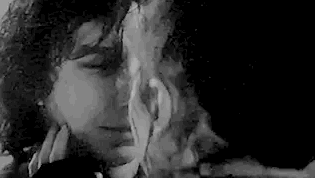
Personal feelings: Twofold. In the cinema, I felt nothing. Nothing. I actually laughed in surprise. Like, “what was that”? The next day, at home, I cried. I don’t think I cried because he died. I was open to that possibility. I cried because I was so, so angry at how poorly his arc and death was handled. Like he was a footnote in his own fucking story. I think him living was a much more interesting story, narratively and thematically, but I wasn’t necessarily opposed to his death if it was done well. And it wasn’t.
Mode of death: Uses the last of his life energy to resurrect Rey. Falls over. (Plop, there he goes.) Fades into the force.
Aftermath: Like, none? Rey looks kind of surprised and blinks for a couple of seconds. No words are exchanged. He just tips over and dies. Cool.
Narrative purpose (or failure thereof): I am fucking reaching here because all of the previously established trajectories and themes are dashed by this ending. We could argue that this is a self-sacrifice to save what you love theme point. Which is fine, but like, no one mourns. He doesn’t become a Force Ghost. No one acknowledges his death. Ben fading into the Force is a metaphor for him fading from people’s minds. It’s like he doesn’t even exist in the context of the story anymore. Which is insanely baffling because all three of the original trilogy heroes sacrificed their lives, at least in part, to save Ben Solo. So that he could in turn save Rey? So he’s just another cog in the machine? This was always about Rey and never about the love Han and Leia had for their son, or that Luke had for his nephew? If you think about it, the only other ‘main’ characters to die during the course of their trilogy were Qui-gon and Padme. And both of those characters had funerals, and people mourning, and huge narrative implications. The death of Ben Solo reads like the death of a minor character. It serves one very narrow and already over-represented theme. The death of all of the rest of the Skywalkers had huge emotional ramifications for the other characters in the films. With Ben Solo, the Skywalker legacy fades as well, as if JJ is telling us that this saga was not about this family at all, but their whole story existed only for the point of saving Palpatine’s granddaughter. How fucked up is that?
Overall response: Narratively, this just doesn’t make sense. It’s lazy and not impactful. When a character dies in films, you want the audience to feel something, so you show other characters reacting to it. Are they sad? Then we should feel sad too! Are they elated? We should be celebrating! No one reacts to Ben’s death, so we’re not sure how we’re supposed to feel, either. The people who are devastated by this death are the ones who love the character itself and are upset that he got treated this way–the death itself was hollow and emotionless.
So, there you have it. Ben Solo was shafted. Death is extremely prevalent in these movies, and yet, being the only new Skywalker of the sequels and half the protagonist (thank you Rian), Ben Solo has arguably the least emotional or narratively impactful death in the franchise.
Rian Johnson would never do this to Ben Solo.



#24 seconds of happiness
-
 foggydinosaurinfluencer liked this · 2 weeks ago
foggydinosaurinfluencer liked this · 2 weeks ago -
 mjllbbpn reblogged this · 1 month ago
mjllbbpn reblogged this · 1 month ago -
 thequeenofcurses liked this · 1 month ago
thequeenofcurses liked this · 1 month ago -
 thenextjedi reblogged this · 1 month ago
thenextjedi reblogged this · 1 month ago -
 couldandwont liked this · 2 months ago
couldandwont liked this · 2 months ago -
 denizaklay21 liked this · 2 months ago
denizaklay21 liked this · 2 months ago -
 sansskelebroo liked this · 3 months ago
sansskelebroo liked this · 3 months ago -
 thelostworld001 liked this · 3 months ago
thelostworld001 liked this · 3 months ago -
 skekzombie liked this · 4 months ago
skekzombie liked this · 4 months ago -
 lydiahosek liked this · 5 months ago
lydiahosek liked this · 5 months ago -
 disciplestrix17 liked this · 5 months ago
disciplestrix17 liked this · 5 months ago -
 waterwitchap3 liked this · 5 months ago
waterwitchap3 liked this · 5 months ago -
 hyperfixating-sharkie liked this · 8 months ago
hyperfixating-sharkie liked this · 8 months ago -
 indreamyhead reblogged this · 9 months ago
indreamyhead reblogged this · 9 months ago -
 indreamyhead liked this · 9 months ago
indreamyhead liked this · 9 months ago -
 explorer-0421 liked this · 9 months ago
explorer-0421 liked this · 9 months ago -
 rainymyx liked this · 9 months ago
rainymyx liked this · 9 months ago -
 pittsburghhockeybirds liked this · 10 months ago
pittsburghhockeybirds liked this · 10 months ago -
 arrayofcaosi liked this · 11 months ago
arrayofcaosi liked this · 11 months ago -
 toyitgg liked this · 11 months ago
toyitgg liked this · 11 months ago -
 loveandmanythings reblogged this · 1 year ago
loveandmanythings reblogged this · 1 year ago -
 mythicalgeek liked this · 1 year ago
mythicalgeek liked this · 1 year ago -
 piglet26 reblogged this · 1 year ago
piglet26 reblogged this · 1 year ago -
 benjaminaskinas liked this · 1 year ago
benjaminaskinas liked this · 1 year ago -
 yoliiv liked this · 1 year ago
yoliiv liked this · 1 year ago -
 oesteffel liked this · 1 year ago
oesteffel liked this · 1 year ago -
 enought-ismytimetoshine liked this · 1 year ago
enought-ismytimetoshine liked this · 1 year ago -
 ilovekauniita reblogged this · 1 year ago
ilovekauniita reblogged this · 1 year ago -
 srawrath reblogged this · 1 year ago
srawrath reblogged this · 1 year ago -
 srawrath liked this · 1 year ago
srawrath liked this · 1 year ago -
 queenmycrofts liked this · 1 year ago
queenmycrofts liked this · 1 year ago -
 o0-snowdrop-0o liked this · 1 year ago
o0-snowdrop-0o liked this · 1 year ago -
 professorplaid liked this · 1 year ago
professorplaid liked this · 1 year ago -
 ofdeadtefire liked this · 1 year ago
ofdeadtefire liked this · 1 year ago -
 pathiddleston95 liked this · 1 year ago
pathiddleston95 liked this · 1 year ago -
 wugelnolara liked this · 1 year ago
wugelnolara liked this · 1 year ago -
 boo3art liked this · 1 year ago
boo3art liked this · 1 year ago -
 lovelyabstract reblogged this · 1 year ago
lovelyabstract reblogged this · 1 year ago -
 fizupore liked this · 1 year ago
fizupore liked this · 1 year ago -
 iritrere liked this · 1 year ago
iritrere liked this · 1 year ago -
 justdimenvea liked this · 1 year ago
justdimenvea liked this · 1 year ago -
 lingdistlipas liked this · 1 year ago
lingdistlipas liked this · 1 year ago -
 nerdtamin liked this · 1 year ago
nerdtamin liked this · 1 year ago -
 meli2021 liked this · 1 year ago
meli2021 liked this · 1 year ago -
 charliebattinson reblogged this · 1 year ago
charliebattinson reblogged this · 1 year ago -
 charliebattinson liked this · 1 year ago
charliebattinson liked this · 1 year ago